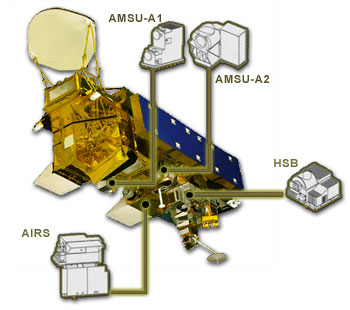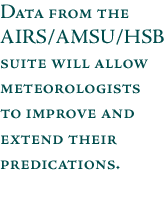| |
The Aqua Spacecraft
In 2002, the Atmospheric Infrared Sounder (AIRS), the Advanced
Microwave Sounding Unit (AMSU), and the Humidity Sounder for Brazil
(HSB) will be launched together on NASA’s Earth Observing System (EOS)
Aqua satellite, a satellite that will also carry a Moderate Resolution
Imaging Spectroradiometer (MODIS), two Clouds and the Earth’s Radiant
Energy System (CERES) sensors, and an Advanced Microwave Scanning
Radiometer for EOS (AMSR-E). The AIRS/AMSU/HSB sounding system will
provide the capability for determining atmospheric temperature and
moisture more accurately than ever before from space-based measurements.
These measurements will be provided to the National Oceanic and
Atmospheric Administration (NOAA), the European Centre for Medium-Range
Weather Forecasts (ECMWF), and the weather community at large for
assimilation into operational numerical weather prediction models. It is
expected that assimilation of global AIRS/AMSU/HSB data, complementing
other operational observations, should lead to a substantial improvement
in the accuracy of mid- and long-range weather forecasts.

The Aqua spacecraft, with pointers to the AMSU-A1, AMSU-A2, AIRS, and HSB instruments.
The AIRS/AMSU/HSB instrument suite builds on the technical heritage
of NOAA’s High Resolution Infrared Sounder (HIRS) and Microwave Sounding
Unit (MSU). The HIRS/MSU combination was the National Weather Service’s
(NWS’s) operational weather sounding system for nearly twenty years,
flying on numerous NOAA polar orbiting satellites. This system was
enhanced in the late 1990s by the replacement of the four-channel MSU by
a 20-channel AMSU, which includes Aqua’s AMSU and HSB channels. Looking
toward further improvements in weather forecasts, the NWS has set
measurement requirements for temperature at an accuracy of 1°C in layers
1 km thick and humidity at an accuracy of 20% in layers 2 km thick in
the troposphere (the lower part of the atmosphere, where weather systems
are of most relevance to human life and property). AIRS/AMSU/HSB will
meet these requirements, allowing meteorologists to improve and extend
their predictions and reduce the number of significant prediction
mistakes, like failing to predict a major storm prior to a few hours
before its arrival.
|
|

Weather Forecasting Through the Ages
Introduction
Early History
Towards Numerical Prediction
Modern Tools of the Trade
The Aqua Spacecraft
Benefits to Society
References
|

